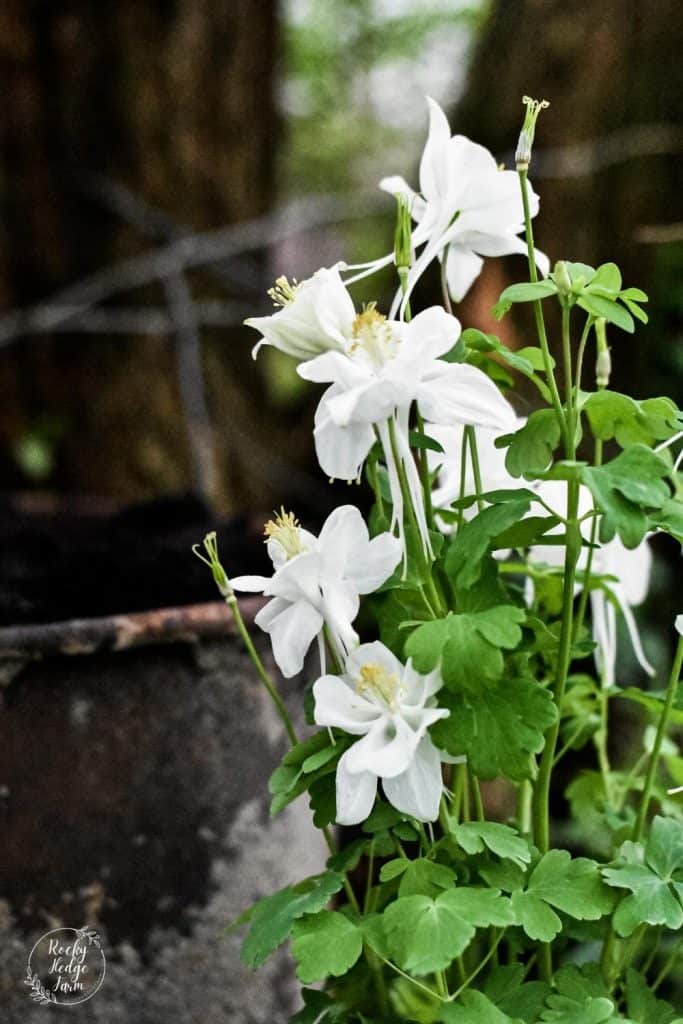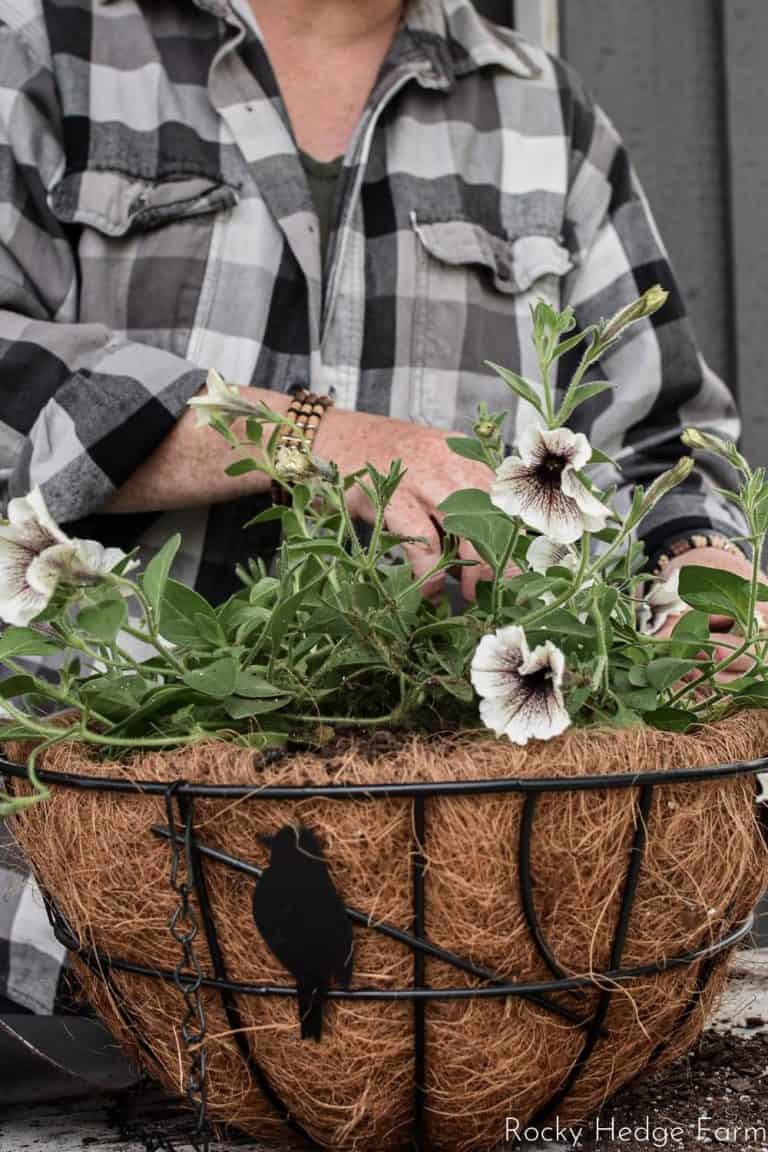8 Best Low Maintenance Perennials for Shade
Choosing the right low maintenance perennials for shade makes it possible to have a beautiful landscape even in your shady yard.
Many people are discouraged from gardening in the shade. They believe that because there is less sunlight, there is less chance for a successful garden.
This is not true. Shade gardens can be easier to maintain and can also have some distinct benefits over full sun gardening.

Low Maintenance White Perennials for Shade
Here at Rocky Hedge Farm, my passion is to create beautiful gardens in shade and part shade, focusing on low-maintenance perennials that bloom white.
White is a color that is often overlooked, but it can do wonders to brighten up a shade flower garden. When you experience the tranquility and beauty of white shade gardens is like taking a deep breath in nature.
When it comes to flower gardening in the shade, you want to make sure you have plants that will bloom white during various times throughout the spring and summer months.
In this post, I share my top eight best low-maintenance perennials for shades with vibrant white blooms that require minimal care. Hopefully, you will find a few you love for the growing season!

Why You Need Low Maintenance Perennials for Shade in Your Garden
Perennials are an excellent choice for anyone who is looking for low-maintenance shady garden flowers. These plants come back every year and grow with beautiful showy flowers that can tolerate shade in your garden.
Shade Perennials Zone 6
Shade-loving plants can be a challenge to find. Finding cold-hardy plants that thrive in shady areas can be even more difficult. Luckily, there are options for low maintenance perennials for shade out there, and these are what I consider to be some of the best shade plants for zone 6:
- Oak Leaf Hydrangea
- Astilbe
- Bleeding Heart
- Hydrangeas
- Hostas
- Columbine
- Ferns
- Coral Bells
Low maintenance plants are a good choice for a shade garden as many of these plants require little care.
When it comes to planting shade-loving plants, there are a few things to consider.
One of the most important aspects to consider when planting low maintenance perennials for shade is your USDA Hardiness Zone. This zone determines the amount of frost or cold weather a plant can withstand and should be considered before planting any plants.
Plant labels are a plant’s resume. They tell you what they need regarding water, sunlight, and soil type. If you want to grow plants that perform well in your area, read the label and ensure they can handle the shade conditions in your yard.

What Does Shade Mean?
Shade and part shade are terms used by gardeners to categorize the amount of sunlight a given plant will receive. Shade plants have low light requirements, typically in the understory of a woodland area or on the north side of trees in a backyard.
Full Shade Perrenials
Full shade perennial flower garden areas take less than an hour of direct sunlight daily. Trees, buildings, and other structures can significantly reduce the amount of sun that reaches the ground.
Part Sun Part Shade Perennials
Partial shade is an area that receives less than four hours but more than one and a half hours of sun. Partial shade plants prefer cooler morning sun and little or no hot afternoon sun.

What is the Best Perennial to Plant in shade?
Sometimes the shadiest spot in your yard is also the most forgotten, but with a few creative landscape ideas and some shade-loving perennials, you can transform any area into your new favorite outdoor space.
This post will list some of the best perennials you can find at your local nursery. So grab your gardening tools, and let’s plant low-maintenance perennials for shade! These plants will give the shadiest part of your flower garden a welcoming place to read, meditate and relax.
Oak Leaf Hydrangea
Oak leaf hydrangeas are a woody, deciduous, partial shade-loving shrub with leaves resembling that of an oak. These super low-maintenance plants need little pruning and have magnificent leaves and dazzling blooms!

Oak leaf hydrangeas are a good choice to add to any shade garden. They grow well in partial shade and can help fill large areas because they establish quickly and have bushy growth that can reach up to 20 feet in height.
In early spring, the dark green leaves unfurl; by summertime, the large, cone-shaped clusters are filled with small white flowers. From compact, dwarf types to large varieties, there is an Oak Leaf Hydrangea for every landscape need!
Height: 2 to 20 feet tall, 5 to 10 feet wide
Growing Zone: 5-9
Plants to Try: Snow Queen, Alice, Snowflake

Astilbe
Astilbes, with their bright delicate blooms, are a favorite of gardeners looking for a mid-summer burst of color. Astilbes have tall showy flower plumes that bloom above delicate deep green ferny foliage.
A little morning sun helps them bloom better, but they will need light shade for the remainder of the day.

Astilbe flowers come in different varieties of colors. Some have white, violet, or deep red hues, while others have pink flowers or purple flowers.
Height: 1 to 4 feet tall and wide
Growing Zone: Most 4-8
Plants to Try: Bridal Veil, Happy Spirit, Snowdrift

Bleeding Heart
The brilliant blooms of the bleeding heart plant appear early in the spring. They are one of the first plants to provide the first blooms in the shade garden.
Few shade flowers can rival the intrigue of the old-fashioned bleeding heart with heart-shaped flowers growing in an arching pattern up from fern-like leaves.

After blooming, this plant dies back in the summer. To cover up the dying foliage, plant hostas, or other bold leafed plants that will grow up and cover the foliage. Bleeding hearts grow beautifully in a woodland setting with other shade-loving plants.
Height: 3 feet tall and wide; compact varieties 1 to 1.5 feet tall and wide.
Growing Zone: 3-9
Plants to Try: Alba, White Old Fashioned, Snowdrift

Hosta
Hostas are shade-loving foliage plants that grow in shaded gardens and containers. They come in various shapes, sizes, and colors to fit every garden style.
They grow well in moist soil and can be planted under trees or along the edge of woods.
Hostas can be planted from bare roots or plants purchased from a local greenhouse. They range from small to extremely large and will need to be split every couple of years if they get too large for their space.

Hostas are hardy in colder zones and tolerate deep shade, making them a perfect plant for a shady spot. Hosta plants make great companions to other woodland plants such as coral bells, ferns, columbines, and astilbes.
Height: 2 inches to 4 feet tall, 5 inches to 6 feet wide
Growing Zones: 3-9
Plants to Try: Thunderbolt, Royal Standard, Guacamole, American Halo,

Columbine
Columbine flowers brighten up any shade garden and are a welcome sign of spring. They typically flower very early in spring with a blooming window of two to three weeks.
Columbines are cool-season perennials that are not very fond of hot summers. They are short-lived perennial plants, but they reseed heavily in the garden.

Columbines are noted for their unique flowers that attract hummingbirds and are shaped like a jester’s cap. They grow in lightly shaded areas and are drought-tolerant once established. Columbines are beautifully planted at the edge of rock gardens with other shade tolerant perennials.
Height: 1-3 ft. tall, 1-2 ft. wide
Growing Zone: 3-8
Plants to Try: Green Apple, Munstead White

Coral Bells
Coral bells (Heuchera) are some of the best-kept secrets in the garden. They are shade tolerant and are easy to grow, making them perfect for shade gardens.

This perennial loves moist soil and shade. The flowers are tiny, but the leaves are beautiful, with a hue to match every garden palette.
They are known for their beautiful green foliage and are an excellent low-maintenance option for shade garden plants. While some coral bells bloom in late spring, others show off pretty white blossoms mid to late summer.
Height: 8 to 12 inches tall, 1 to 2 feet wide; flower stalks can reach 2 to 3 feet tall
Growing Zone: 3-9
Plants to Try: Blackberry Ice, Chocolate Truffles, Lava Lamp

Hydrangeas
Hydrangea is one of the most beloved flowering perennial choices for shade gardens because it blooms in early summer until early fall. Hydrangea bushes need little to no maintenance other than occasional pruning.

Hydrangeas are versatile, easy to grow, and a great addition to any garden. They come in a variety of colors, styles, and shapes. They grow quickly and often bloom in shades of blue, purple, and pink, with some selections in white or green.
Height: 2 to 20 feet tall, 5 to 10 feet wide
Growing Zone: 4-9
Plants to Try: White Wedding, Wee White, Limelight

Ferns
One of the oldest living plants, there are dozens of different kinds of ferns that are available for planting in shady spots. Ferns are a must-have addition providing color and texture to any woodland or heavy shade garden.

These reliable perennials are grown for their attractive fronds and pair well with nearly any woodland shade plant.
Height: Ferns come in various sizes ranging from just a few inches to over six feet tall, depending on the variety and growing conditions.
Growing Zone: There’s a fern suitable for nearly every zone.
Plants to Try: Lady Fern, Ostrich Fern, Wood Fern, Japanese Painted Fern

Low Maintenance Shade Perennials
If you’re seeking low-maintenance perennials for shade to add to your garden space, consider some of the perennials listed above.
These are the best plants for a shady spot. Including shade lover plants in your landscape will provide not only some much-needed colorful garden plants but also a landscape that is a beautiful and serene retreat to relax in.







I just love this! I have been wanting to do an all white bloomers garden for such a long time and everything you showed is what I am looking for! I have lots of shade trees in my front yard, so these are definitely selections I will be trying. It was so nice to see how your plants look filled in – sometimes it is hard to tell at the garden store how they will look in a few years. Any other suggestions on shade shrubs?
Thank you! I love having all white flowers. I have the Oak Hydrangea in shade as well as a few other Hydrangeas that are in part shade/part sun.
Sarah,
Excellent tips and advice…
Thanks for sharing !
You are so welcome! Thanks for visiting!
Thanks for sharing really enjoyed this post !!!